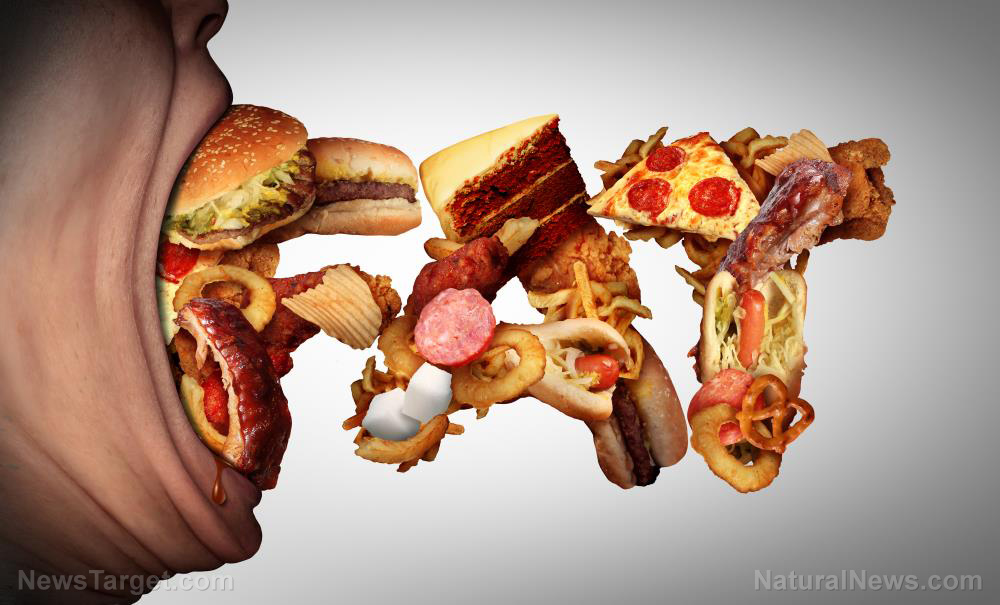Eat healthier to improve your physical and mental well-being
06/04/2019 / By Evangelyn Rodriguez

The physical health and mental well-being of a person depend a lot on nutrition and the food that he eats. Diet also influences the risk of developing chronic diseases. While the relationship between physical health and diet is well-understood, little is known about how diet and its quality influence the development of mental disorders. In a recent study, researchers from the University of Regensburg in Germany investigated the behavioral effects of a Western diet on pattern separation – the process of keeping items distinct in memory. They discovered that a diet consisting of increased amounts of sugar and saturated fatty acids, reduced levels of polyunsaturated fatty acids, and an increased ratio of omega-6/omega-3 fatty acids (Western diet) harms memory. The results of their study were published in the journal Food Science and Human Wellness.
The Western diet impairs pattern separation
In this study, researchers investigated the utility of spatial separation – a behavioral process associated with the hippocampus – in the assessment of dietary interventions and the behavioral effects of the transgenerational administration of a Western diet on pattern separation. Pattern separation is the process of keeping items distinct in memory and is mediated by the hippocampus. Previous studies have suggested that there is a relationship between hippocampal function and diet quality in both humans and animals.
To examine the association between them, the researchers used rats, feeding over seven generations a diet containing increased amounts of sugar and saturated fatty acids, reduced levels of polyunsaturated fatty acids, and an increased ratio of omega-6/omega-3 fatty acids. This diet composition is characteristic of a diet known as the Western diet. The researchers administered it transgenerationally because previous studies have shown that interventional diets need to be implemented over several generations to induce behavioral effects.
They compared the spatial pattern separation (or local discrimination) performance of these animals with that of rats fed a standard diet. For the test, they presented the rats two locations and allowed them to learn across trials to respond to the correct location. During spatial discrimination training, they designated a location as the correct one and rewarded the rats if they touched the correct location. They reversed the correct and incorrect locations every time the rats successfully got the correct ones nine times out of 10 trials.
The researchers found a separation-dependent difference between the standard and Western diet groups in the number of discriminations performed in the pattern separation task. The rats fed with a Western diet performed fewer discriminations. Rats with lesions in the dorsal hippocampus showed impaired pattern separation when the locations were close together but not when they were far apart. The researchers associated this impairment with hippocampal dysfunctioning. Their results align with previous studies which demonstrated that consumption of a Western diet impaired cognitive functions, damaged brain regions, and contributed to the occurrence of neurodegenerative diseases. Their results confirmed that pattern separation could be negatively affected by transgenerational administration of a Western diet.
The researchers concluded that spatial pattern separation can help detect the effects of dietary interventions and that the Western diet can impair pattern separation.
How to make your diet healthier
A healthy diet can provide many benefits, the most important of which is the prevention of chronic diseases. Here are some things that you can do to make your diet healthier:
- Eat slowly
- Choose whole grains
- Add probiotics to your diet
- Increase your protein intake
- Drink plenty of water
- Avoid frying food and eating fast food
- Take vitamin and mineral supplements
- Try new and healthy recipes
- Eat vegetables first before every meal
- Eat fruits instead of drinking them
- Exercise regularly
- Stop drinking sweetened beverages
- Get adequate sleep
Eating healthier and becoming aware of your nutritional needs will not only improve your physical health, but these will also benefit your mental and emotional well-being.
Sources include:
Tagged Under: behavioral effects, brain function, brain health, cognitive function, diet, dietary interventions, Diseases, fast food, fatty acids, hippocampal function, hippocampus, memory, memory impairment, Mental Disorders, mental health, mind body science, pattern separation, research, spatial separation, sugar, western diet
RECENT NEWS & ARTICLES
StopEatingPoison.com is a fact-based public education website published by Stop Eating Poison Features, LLC.
All content copyright © 2018 by Stop Eating Poison Features, LLC.
Contact Us with Tips or Corrections
All trademarks, registered trademarks and servicemarks mentioned on this site are the property of their respective owners.


















